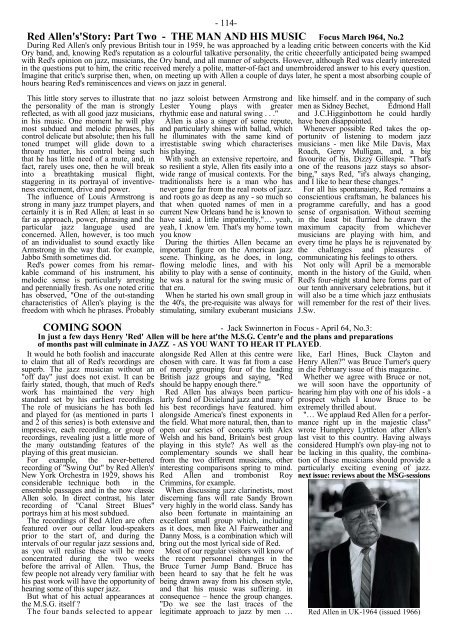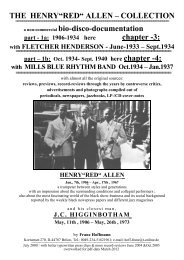Red Allen Chapters 9 - The Jazz Archive
Red Allen Chapters 9 - The Jazz Archive
Red Allen Chapters 9 - The Jazz Archive
You also want an ePaper? Increase the reach of your titles
YUMPU automatically turns print PDFs into web optimized ePapers that Google loves.
- 114-<br />
<strong>Red</strong> <strong>Allen</strong>'s'Story: Part Two - THE MAN AND HIS MUSIC Focus March l964, No.2<br />
During <strong>Red</strong> <strong>Allen</strong>'s only previous British tour in 1959, he was approached by a leading critic between concerts with the Kid<br />
Ory band, and, knowing <strong>Red</strong>'s reputation as a colourful talkative personality, the critic cheeerfully anticipated being swamped<br />
with <strong>Red</strong>'s opinion on jazz, musicians, the Ory band, and all manner of subjects. However, although <strong>Red</strong> was clearly interested<br />
in the questions put to him, the critic received merely a polite, matter-of-fact and unembroidered answer to his every question.<br />
Imagine that critic's surprise then, when, on meeting up with <strong>Allen</strong> a couple of days later, he spent a most absorbing couple of<br />
hours hearing <strong>Red</strong>'s reminiscences and views on jazz in general.<br />
This little story serves to illustrate that<br />
the personality of the man is strongly<br />
reflected, as with all good jazz musicians,<br />
in his music. One moment he will play<br />
most subdued and melodic phrases, his<br />
control delicate but absolute; then his full<br />
toned trumpet will glide down to a<br />
throaty mutter, his control being such<br />
that he has little need of a mute, and, in<br />
fact, rarely uses one, then he will break<br />
into a breathtaking musical flight,<br />
staggering in its portrayal of inventiveness<br />
excitement, drive and power.<br />
<strong>The</strong> influence of Louis Armstrong is<br />
strong in many jazz trumpet players, and<br />
certainly it is in <strong>Red</strong> <strong>Allen</strong>; at least in so<br />
far as approach, power, phrasing and the<br />
particular jazz language used are<br />
concerned. <strong>Allen</strong>, however, is too much<br />
of an individualist to sound exactly like<br />
Armstrong in the way that. for example,<br />
Jabbo Smith sometimes did.<br />
<strong>Red</strong>'s power comes from his remarkable<br />
command of his instrument, his<br />
melodic sense is particularly arresting<br />
and perennially fresh. As one noted critic<br />
has observed, "One of the out-standing<br />
characteristics of <strong>Allen</strong>'s playing is the<br />
freedom with which he phrases. Probably<br />
no jazz soloist between Armstrong and<br />
Lester Young plays with greater<br />
rhythmic ease and natural swing . . ."<br />
<strong>Allen</strong> is also a singer of some repute,<br />
and particularly shines with ballad, which<br />
he illuminates with the same kind of<br />
irrestistable swing which characterises<br />
his playing.<br />
With such an extensive repertoire, and<br />
so resilient a style, <strong>Allen</strong> fits easily into a<br />
wide range of musical contexts. For the<br />
traditionalists here is a man who has<br />
never gone far from the real roots of jazz.<br />
and roots go as deep as any - so much so<br />
that when quoted names of men in a<br />
current New Orleans band he is known to<br />
have said, a little impatiently,"… yeah,<br />
yeah, I .know 'em. That's my home town<br />
you know<br />
During the thirties <strong>Allen</strong> became an<br />
important figure on the American jazz<br />
scene. Thinking, as he does, in long,<br />
flowing melodic lines, and with his<br />
ability to play with a sense of continuity,<br />
he was a natural for the swing music of<br />
that era.<br />
When he started his own small group in<br />
the 40's, the pre-requisite was always for<br />
stimulating, similary exuberant musicians<br />
like himself. and in the company of such<br />
men as Sidney Bechet, Edmond Hall<br />
and J.C.Higginbottom he could hardly<br />
have been disappointed.<br />
Whenever possible <strong>Red</strong> takes the opportunitv<br />
of listening to modern jazz<br />
musicians - men like Mile Davis, Max<br />
Roach, Gerry Mulligan, and, a big<br />
favourite of his, Dizzy Gillespie. "That's<br />
one of the reasons jazz stays so absorbing,"<br />
says <strong>Red</strong>, "it's always changing,<br />
and I like to hear these changes."<br />
For all his spontanaiety, <strong>Red</strong> remains a<br />
conscientious craftsman, he balances his<br />
programme carefully, and has a good<br />
sense of organisation. Without seeming<br />
in the least bit flurried he drawn the<br />
maximum capacity from whichever<br />
musicians are playing with him, and<br />
every time he plays he is rejuvenated by<br />
the challenges and pleasures of<br />
communicating his feelings to others.<br />
Not only will April be a memorable<br />
month in the history of the Guild, when<br />
<strong>Red</strong>'s four-night stand here forms part of<br />
our tenth anniversary celebrations, but it<br />
will also be a time which jazz enthusiats<br />
will remember for the rest of' their lives.<br />
J.Sw.<br />
COMING SOON - Jack Swinnerton in Focus - April 64, No.3:<br />
In just a few days Henry '<strong>Red</strong>' <strong>Allen</strong> will be here at'the M.S.G. Centr'e and the plans and preparations<br />
of months past will culminate in JAZZ - AS YOU WANT TO HEAR IT PLAYED.<br />
It would he both foolish and inaccurate<br />
to claim that all of <strong>Red</strong>'s recordings are<br />
superb. <strong>The</strong> jazz musician without an<br />
"off day" just does not exist. It can be<br />
fairly stated, though, that much of <strong>Red</strong>'s<br />
work has maintained the very high<br />
standard set by his earliest recordings.<br />
<strong>The</strong> role of musicians he has both led<br />
and played for (as mentioned in parts 1<br />
and 2 of this series) is both extensive and<br />
impressive, each recording, or group of<br />
recordings, revealing just a little more of<br />
the many outstanding features of the<br />
playing of this great musician.<br />
For example, the never-bettered<br />
recording of "Swing Out" by <strong>Red</strong> <strong>Allen</strong>'s'<br />
New York Orchestra in 1929, shows his<br />
considerable technique both in the<br />
ensemble passages and in the now classic<br />
<strong>Allen</strong> solo. In direct contrast, his later<br />
recording of "Canal Street Blues"<br />
portrays him at his most subdued.<br />
<strong>The</strong> recordings of <strong>Red</strong> <strong>Allen</strong> are often<br />
featured over our cellar loud-speakers<br />
prior to the start of, and during the<br />
intervals of our regular jazz sessions and,<br />
as you will realise these will be more<br />
concentrated during the two weeks<br />
before the arrival of <strong>Allen</strong>. Thus, the<br />
few people not already very familiar with<br />
his past work will have the opportunity of<br />
hearing some of this super jazz.<br />
But what of his actual appearances at<br />
the M.S.G. itself ?<br />
<strong>The</strong> four bands selected to appear<br />
alongside <strong>Red</strong> <strong>Allen</strong> at this centre were<br />
chosen with care. It was fat from a case<br />
of merely grouping four of the leading<br />
British jazz groups and saying, "<strong>Red</strong><br />
should be happy enough there."<br />
<strong>Red</strong> <strong>Allen</strong> has always been particularly<br />
fond of Dixieland jazz and many of<br />
his best recordings have featured. him<br />
alongside America's finest exponents in<br />
the field. What more natural, then, than to<br />
open our series of concerts with Alex<br />
Welsh and his band, Britain's best group<br />
playing in this style? As well as the<br />
complementary sounds we shall hear<br />
from the two different musicians, other<br />
interesting comparisons spring to mind.<br />
<strong>Red</strong> <strong>Allen</strong> and trombonist Roy<br />
Crimmins, for example.<br />
When discussing jazz clarinetists, most<br />
discerning fans will rate Sandy Brown<br />
very highly in the world class. Sandy has<br />
also been fortunate in maintaining an<br />
excellent small group which, including<br />
as it does, men like Al Fairweather and<br />
Danny Moss, is a combination which will<br />
bring out the most lyrical side of <strong>Red</strong>.<br />
Most of our regular visitors will know of<br />
the recent personnel changes in the<br />
Bruce Turner Jump Band. Bruce has<br />
been heard to say that he felt he was<br />
being drawn away from his chosen style,<br />
and that his music was suffering. in<br />
consequence – hence the group changes.<br />
"Do we see the last traces of the<br />
legitimate approach to jazz by men …<br />
like, Earl Hines, Buck Clayton and<br />
Henry <strong>Allen</strong>?" was Bruce Turner's query<br />
in die February issue of this magazine.<br />
Whether we agree with Bruce or not,<br />
we will soon have the opportunity of<br />
hearing him play with one of his idols - a<br />
prospect which I know Bruce to be<br />
extremely thrilled about.<br />
"… We applaud <strong>Red</strong> <strong>Allen</strong> for a performance<br />
right up in the majestic class"<br />
wrote Humphrey Lyttleton after <strong>Allen</strong>'s<br />
last visit to this country. Having always<br />
considered Humph's own play-ing not to<br />
be lacking in this quality, the combination<br />
of these musicians should provide a<br />
particularly exciting evening of jazz.<br />
next issue: reviews about the MSG-sessions<br />
<strong>Red</strong> <strong>Allen</strong> in UK-1964 (issued 1966)



